Hello and welcome,
I want to begin this week saying how sad I was to hear the news that four Missionaries of Charity were killed together with another 12 people when terrorists attacked their convent in Yemen. 
I ask that you join me in praying for the many Catholic missionaries who are risking their lives every day in countries where they are targeted for practicing the works of mercy.
– – –
Last Thursday, we had one of our regular meetings of the Massachusetts Catholic Conference. In addition to the bishops of the four dioceses, with us were our directors of Catholic Charities, diocesan counsels and Catholic school officials. 
We had a very full meeting, but one of the key issues we discussed was our desire to support the efforts to deal with the terrible plague of opiate abuse and the resultant overdoses that have become all too frequent.
As a result of our discussions, we, the bishops, issued the following statement this past week, that I would like share with you here:
The abuse and misuse of opioids has become a national and local epidemic that has increasingly been felt in the Commonwealth of Massachusetts in recent years. On average, four people lose their lives each day in this state, due to illegal and legal drug overdoses. It is a disturbing trend that must be stopped. In this year of Divine Mercy in the Catholic Church, we, the four Bishops of Massachusetts join health care professionals, law enforcement, first responders, elected officials and countless others affected by this epidemic in calling for a comprehensive plan to address this growing crisis.
Given the scope of the problem, we feel some degree of urgency to find a solution to this public health and policy crisis that has reached dangerous levels. The lives negatively impacted by this disaster represent all economic, age, gender or racial categories. The impact is far reaching, leading to the eventual breakdown of families, friendships, neighborhoods and communities.
The solution to this tragic problem is not easy to define; it will be even more difficult to implement. The enormity of the problem, however, calls for an immediate and sweeping response. As that response is crafted, we must be mindful that on one hand, medical professionals must continue to care for their patients by prescribing these powerful drugs for long and short term pain management. On the other hand, overuse by the patient, along with access to vast quantities of opioids by unintended users, often leads to abuse, addiction and death. We exhort health care providers to demand improved education within their own professional groups about the appropriate indications, prescriptions and use of opioid medications.
We must offer help, support and comfort to those who have formed an addiction to prescription pain killers, as well as to those individuals who have formed an addiction to illegal drugs. While new legislation alone will not solve the opioid crisis in Massachusetts, it is a critical step that must be taken soon. We urge the Governor and the legislature to continue their work on this legislation and to provide the necessary resources, human and fiscal, to implement comprehensive education and treatment services to address and correct this ever-growing crisis.
We encourage our sisters and brothers who are suffering addiction or the addiction of loved ones to turn to their faith community for support, counsel and compassion, and we pray that those most affected will receive the physical, emotional and spiritual help that they need.
– – –
Friday, I was visited by Dr. John Haas, the president of the National Catholic Bioethics Center to update me on the work of the NCBC, of which I’m a board member.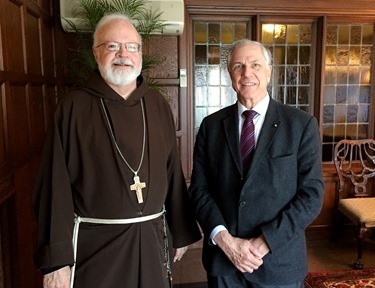
The meeting was also an opportunity to thank him for the many contributions that the Center makes to the work of the Church in the United States and throughout the world. Here in the archdiocese, Dr. Haas has given classes at St. John’s Seminary and Father Tad Pacholczyk, the Director of Education at the NCBC, is a regular contributor to our archdiocesan newspaper, The Pilot.
– – –
During the course of the year, I gather with different groups of seminarians at the Cathedral rectory for Vespers and dinner. It is an opportunity to get to know the seminarians a little better. This week, I met with two different groups.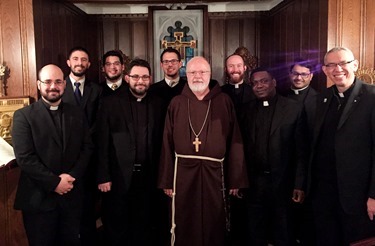
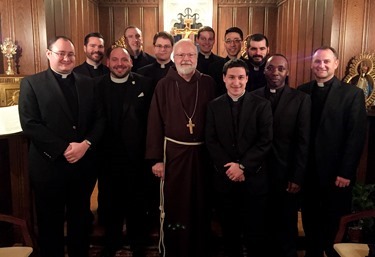
– – –
Saturday, I visited Immaculate Conception in Lowell to celebrate a Mass to mark the completion of their church restorations.
Immaculate Conception is one of the grand churches we have in the archdiocese but, unfortunately, because of very serious structural problems, we were in danger of possibly having to close the church. (It’s always sad to have to close a church but, when the church is that monumental, it is truly tragic.) In fact, for a long time, Mass had to be celebrated in the church basement. However, thanks to the dedication and incredible energy of Father Nick Sannella, the church has been saved.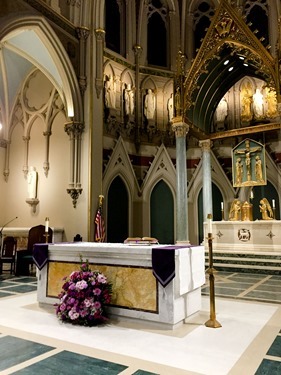
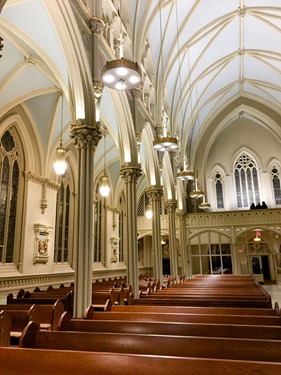
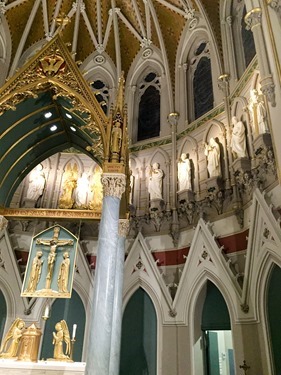
We were joined by a full church of people from Lowell, who are so proud and grateful that this landmark for their Church and their city has been saved. 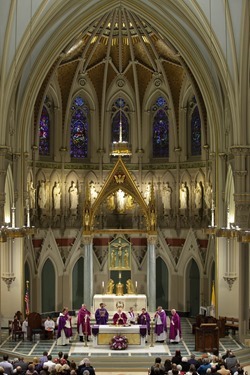
The Oblates of Mary Immaculate had staffed that church for many years and we were very happy that the former pastor, Father John Hanley, was also able to be with us for the occasion. I’m sure the Oblates are also very happy to see the church rescued.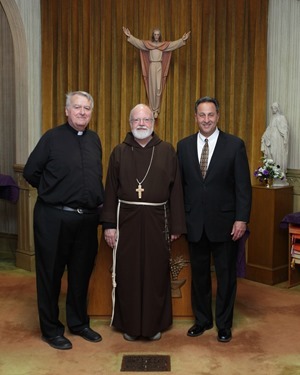
The renovation work on the church was done by Deacon Tom Palanza, a deacon from St. Mary’s in Mansfield who owns a construction company that specializes in church renovations. Deacon Tom and his crew of extraordinary craftsmen have done extraordinary job. The church was in terrible shape, and now it is just stunning. They even brought the Stations of the Cross from the now-closed Sacred Heart Church in Fall River. The stations weigh 300 pounds apiece, but they look as if they were custom made for Immaculate Conception, they fit so flawlessly with the décor.
– – –
On Sunday, I visited the Catholic Center at Northeastern University to celebrate Mass with the students and the campus ministers from the Brotherhood of Hope: Father Paul Helfrich, Father Sam and Brother Logan.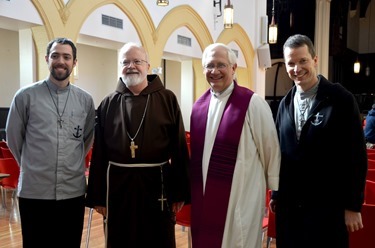
They have a very active campus ministry there that takes in not just Northeastern, but also many of the other colleges in the Fenway area.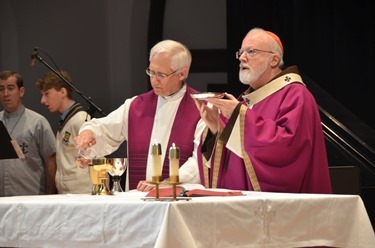
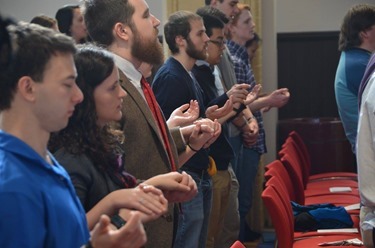
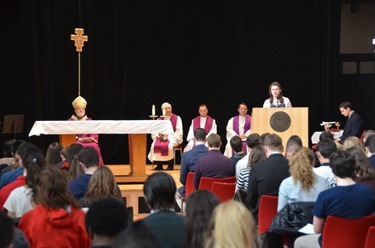
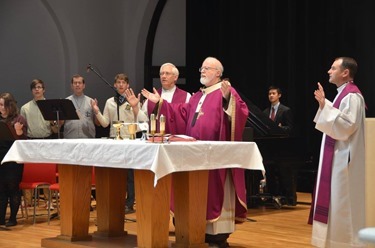
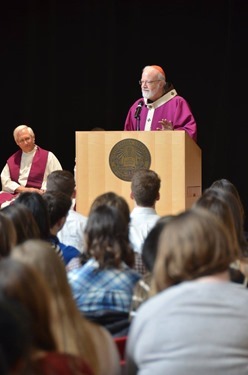
After the Mass, there was a reception at which I was able to meet and speak with some of the students. I was very pleased to see that several students had been in our vocation discernment retreat that I mentioned last week.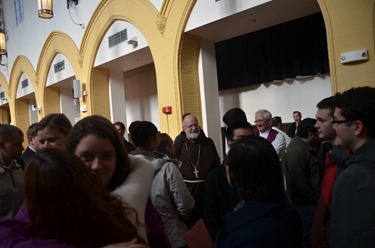
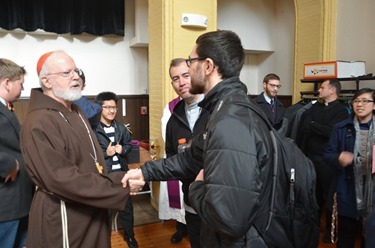
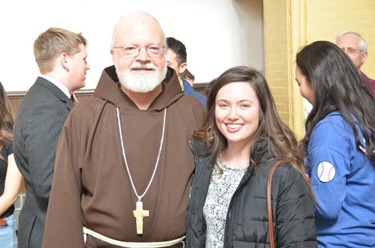
– – –
On Monday I visited Catholic Memorial High School for a Mass.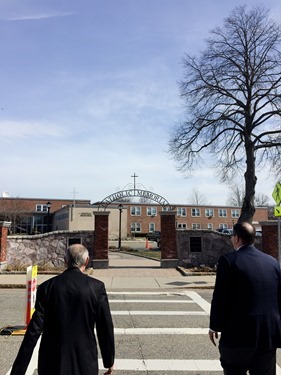
During my visit I had an opportunity to see the school and speak with some of the students.
A highlight of my tour was a visit to the school’s new innovation lab. They were busy making boats that will someday float in the Charles River, and they were also making clocks.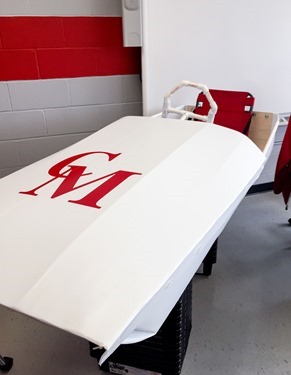

As a memento of my visit, they gave me the gift of this 3-D printed Celtic cross.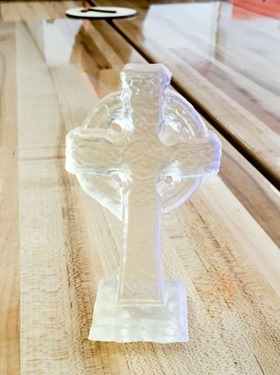
– – –
On Tuesday, I went to St. Anthony’s Parish in Cambridge, for a visit by officials of the Universidade Católica Portuguesa (The Catholic University of Portugal). 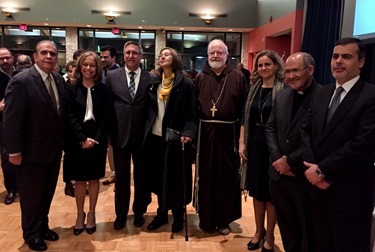
This university was started at the time of the revolution, and there was great concern about training Catholic leaders in a country like Portugal. The university has thrived and is now one of the finest universities in Portugal. Not only that, but they have helped start Catholic universities in Angola, Mozambique and Macau – all former Portuguese colonies — and they are now poised to help the Church in Cape Verde found a Catholic university there, as well.
Cardinal Medeiros was very supportive of the university and he started an association to support it. Every year, they would host a fundraiser held either in Boston or Fall River. In my years in Fall River, I was very involved in this effort, as well. They are still very grateful for all the help they received from the Luso-Americans in the United States, particularly those here in New England. As I have mentioned in the past, one of the main supporters of the university was Joe Fernandes, the Portuguese-American businessman from Madeira who owned the well-known chain of supermarkets.
My visit to St. Anthony’s was an occasion to celebrate a Mass for Cardinal Medeiros and all the benefactors and friends of the university and also for the group from the university to announce their desire to once again strengthen their ties with the Luso-American community. 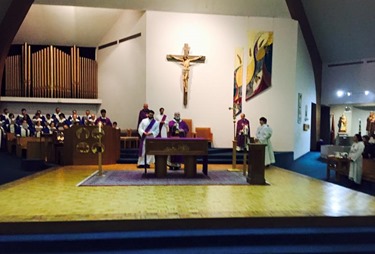
To that end, they have started a scholarship program that will present five full scholarships to Portuguese Americans who would like to study at the Catholic University of Portugal.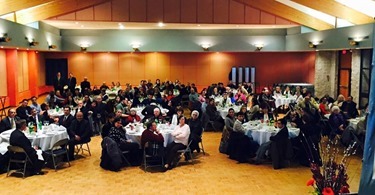
At the Mass, we were joined by the Portuguese consul and a number of elected officials. It was a beautiful celebration. St. Anthony’s has a magnificent choir that sang for us. They presented us with a beautiful statue of Nossa Senhora da Sabedoria that is a replica of a medieval statue that is in the chapel of the Catholic University.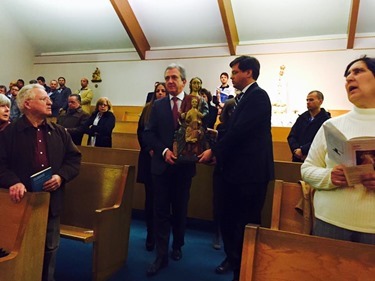
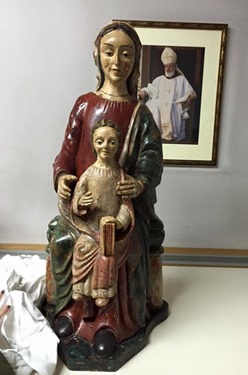
– – –
St. Anthony’s, which has traditionally been an Azorean Portuguese community, has expanded their ministry to the Brazilian community of late, and now there is a very strong Brazilian community there.
So, during my visit, representatives of a couple of Brazilian parish groups came to greet me.
The first was a community in the parish called Shalom.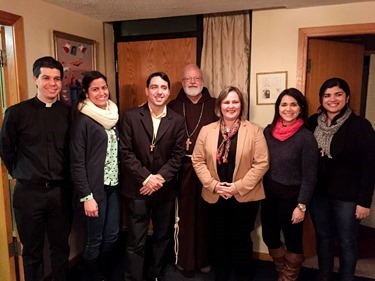
There was also another group called the Men of the Rosary, Terço dos Homens. They all wear a shirt with the picture of the Blessed Mother on it.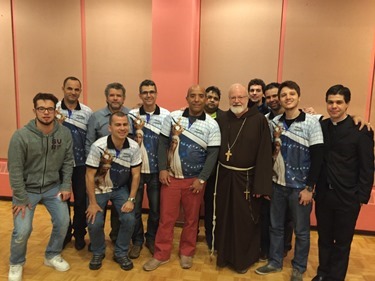
– – –
Finally, as many of you know, the film “Spotlight” received two Academy Awards last Sunday night. I want share with you the statement I released this week on the film:
Spotlight is an important film for all impacted by the tragedy of clergy sexual abuse. By providing in-depth reporting on the history of the clergy sexual abuse crisis, the media led the Church to acknowledge the crimes and sins of its personnel and to begin to address its failings, the harm done to victims and their families and the needs of survivors. In a democracy such as ours, journalism is essential to our way of life. The media’s role in revealing the sexual abuse crisis opened a door through which the Church has walked in responding to the needs of survivors.
Protecting children and providing support for survivors and their families must be a priority in all aspects of the life of the Church.
We are committed to vigilant implementation of policies and procedures for preventing the recurrence of the tragedy of the abuse of children. These include comprehensive child safety education programs, mandatory background checks and safe environments training, mandatory reporting to and cooperating with civil authorities with regard to allegations of abuse, and caring for survivors and their families through the Office of Pastoral Support and Outreach. The Archdiocese consistently provides counselling and medical services for survivors and family members who seek our help and we remain steadfast in that commitment. We continue to seek the forgiveness of all who have been harmed by the tragedy of clergy sexual abuse and pray that each day the Lord may guide us on the path toward healing and renewal.
Until next week,
Cardinal Seán
